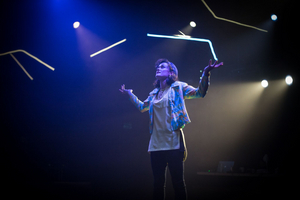Review: A HISTORY OF WATER IN THE MIDDLE EAST, Royal Court

![]() British-Egyptian Sabrina Mahfouz has created a lecture/music gig about the history of water in the Middle East. And therefore the play is called... A History of Water in the Middle East.
British-Egyptian Sabrina Mahfouz has created a lecture/music gig about the history of water in the Middle East. And therefore the play is called... A History of Water in the Middle East.
It's a self-proclaimed "highly edited, highly condensed" history, yet it breaches the banks of its no-fuss title and extends to an intricate exploration of identity, history, and hope.
Mahfouz can't sing - her words, not mine - so is joined by Laura Hanna, who absolutely can. Kareem Samara provides a transportive soundscape with a collection of traditional Middle-Eastern instruments. It's also a bit 'ravey' at times. It's intuitive to the multi-modal nature of the show: spoken word, poetry, music, and lecture.
Despite the piece running at just over an hour, the trio does a near-miracle job of chronicling the history of water in 12 different countries. They're aided by graphics (by Charli Davis), which help with the geography, alongside a trail of blue neon lights which hang over the audience, tracing the rivers.
The show is built on a history which takes you from the tale of Sumerian Goddess Ninhursag, thousands of years ago, to the impact of Britain's imperialism on Iraq at the turn of the century, to present-day Yemen. We even go to Jordan in 2050.
Inevitably, you get a bit lost at times, though the lecture aspect is never dry (pun intended). However, it's the little vignettes that cement the civilian cost of endless water conflicts into your psyche. For the current situation in Yemen, you're told cold hard facts - true to the last 30 days. The show is alive to its immediate social context, weaving the past through it to capture the cyclical, exhaustive nature of the threat to water- environmental or man-made, which is persisting.
The plot also incorporates some personal history - of both Laura and Sabrina, but mainly the latter, as she punctuates the performance with the interesting, albeit harrowing, story of the time she applied to be a spy in the UK. It's a stark a reminder of the ongoing institutionalised, and damaging, suspicion of individuals with an identity which is not so easy to define.
I'm a PhD student, and only a couple of hours before the show, I'd read this quote by scholar Sara Ahmed: "Hope is crucial to the act of protest: hope is what allows us to feel that what angers us is not inevitable, even if transformation can sometimes feel impossible."
A History of Water in the Middle East embodies hope at its most problematic. It knows the limits of its activism in a little theatre in Sloane Square. But it's a playful, water-tight excavation of the sinister living legacy of Britain's empirical history. It might only create a pocket of solidarity on a planet built upon conflict, but it's so welcome. Anything that forges such a tangible connection to, as Mahfouz says, "those who can't be seen", should be seen. See it.
A History of Water in the Middle East is at Royal Court Theatre until 16 November.
Photo Credit: Craig Sugden
Reader Reviews

Videos
